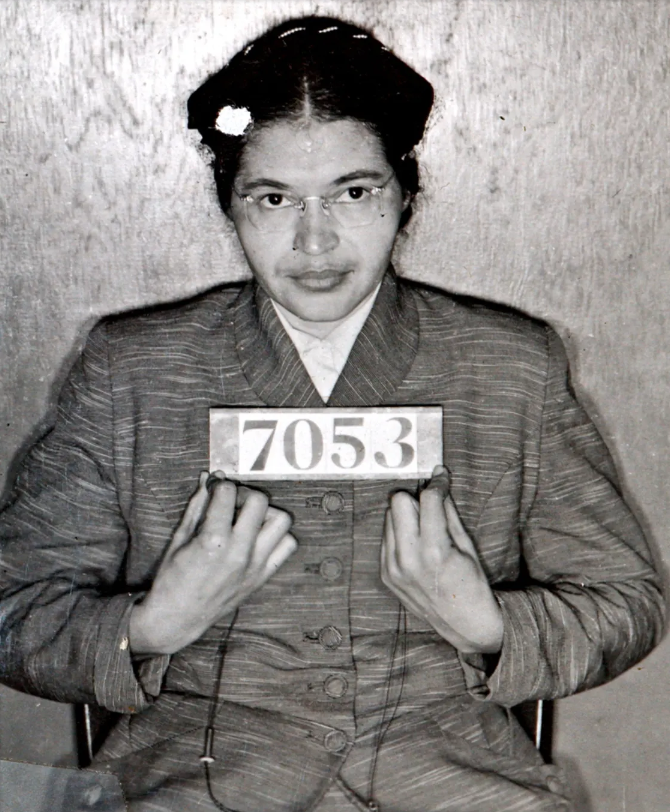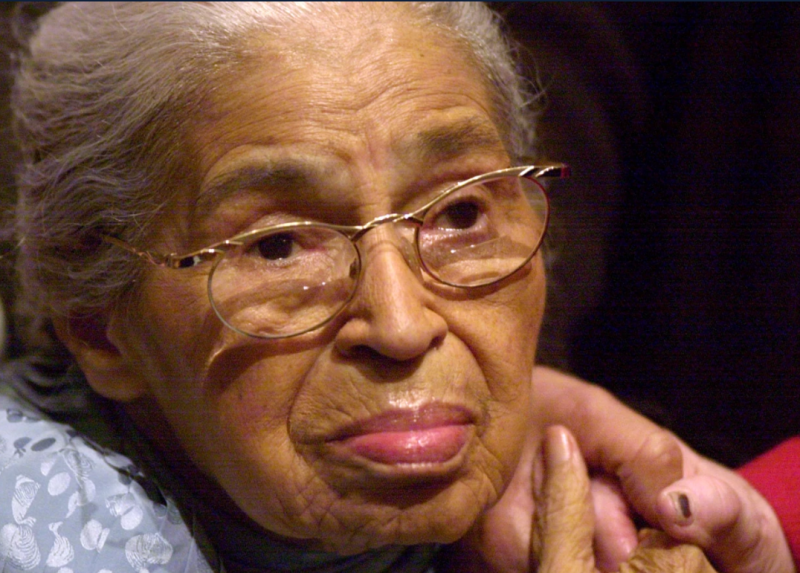Rosa Parks biography, tells a story about a woman who sparked a revolution. Her simple act of refusing to give up her seat on a bus in Montgomery, Alabama, back in 1955 ignited the Montgomery bus boycott. This boycott marked a moment in the civil rights movement. Parks bravery and strong beliefs made her an iconic figure worldwide, symbolizing resistance against injustice and offering hope to millions.
Rosa Parks Biography: Early Life
On February 4, 1913, Rosa Louise McCauley was born in Tuskegee, Alabama. Growing up amidst the realities of segregation had an impact on her upbringing. Her parents, James and Leona McCauley, instilled in her values of resilience and a belief in equality. Despite facing discrimination at every turn, Parks exhibited a thirst for knowledge and an earnest desire for the world.
Education
Despite facing opportunities during that era, Parks showed unwavering dedication to education. She attended the Montgomery Industrial School for Girls before enrolling at the Alabama State Teachers College for Negroes. Throughout her studies, Parks became increasingly aware of injustice, which led her to join the National Association for the Advancement of Colored People (NAACP) in 1943.

The Montgomery Bus Boycott
Parks arrest on December 1st, 1955, brought her into the spotlight. Her refusal to give up her seat to a man on a bus sparked outrage and became the driving force behind the Montgomery bus boycott. Under the leadership of Martin Luther King Jr., a 381-day protest unfolded, severely impacting the city’s transportation system and gaining attention worldwide. Eventually, this boycott resulted in buses in Montgomery being desegregated, marking a victory for the Civil Rights Movement.
Her Advocacy Journey
While Parks role in the Montgomery bus boycott is well known, her dedication to justice extended beyond that momentous event. She emerged as a symbol of the Civil Rights Movement. Embarked on extensive travels to speak about racial equality and human rights. Collaborating tirelessly with figures like Martin Luther King Jr., Ralph Abernathy and E.D. Nixon, she lent her voice to causes and inspired countless individuals along the way.
Rosa Parks Family
In 1932, Parks tied the knot with Raymond Parks, a barber who shared her commitment to justice. Although they did not have children of their own, their partnership provided strength and support. Raymond actively supported Rosa’s activism by joining her at rallies and protests regularly.
Rosa Parks faced challenges and personal struggles despite her unwavering determination. She had to endure threats, harassment and even death threats due to her activism. However, she remained resolute in her commitment to equality. As time went on, Parks also confronted health issues with the strength she had shown throughout her life.
The life and legacy of Rosa Parks serve as a testament to the significance of courage and conviction. Her simple act of defiance ignited a spark that fueled the Civil Rights Movement and altered the course of history. Her story continues to inspire generations, encouraging them to advocate for a fairer and more just society. It reminds us that even ordinary individuals can make an impact.
Rosa Parks received awards and recognition for her contributions to the Civil Rights Movement, including:
- Presidential Medal of Freedom
- Congressional Gold Medal
- NAACP Spingarn Medal
- Martin Luther King Jr. Medal of Freedom
- A bronze statue in the National Statuary Hall in Washington, D.C.
During her years, Parks remained vocal against injustice while advocating for equality. She continued to be a source of inspiration and encouragement for individuals, showcasing the enduring power of her legacy. Rosa Parks peacefully passed away on October 24, 2005, at the age of 92.
She was a woman who possessed strength and unwavering courage. Her life story serves as a ray of hope and a testament to the power of activism. Rosa Parks teaches us that even the smallest act of defiance can ignite change, highlighting our potential to make a difference in this world. Her legacy continues to inspire generations to fight for justice and equality, firmly establishing her as one of the greatest figures in American history.
Frequently Asked Questions about Rosa Parks;
- What was Rosa Parks occupation?
Rosa Parks worked as a seamstress while also dedicating herself to civil rights activism.
- What were the consequences of Rosa Parks refusal to give up her seat?
As a result of refusing to give up her seat, Rosa Parks was. Faced fines for violating segregation laws. However, her arrest ignited the Montgomery bus boycott, ultimately leading to the desegregation of buses in Montgomery.
- What were some achievements by Rosa Parks?
Rosa Parks received awards recognizing her contributions to the civil rights movement. These accolades include the Congressional Gold Medal, the Presidential Medal of Freedom, and the NAACP Spingarn Medal.
4. How did Rosa Parks influence the civil rights movement?
Rosa Parks brave act of defiance in 1955 ignited the Montgomery bus boycott, which is widely regarded as a moment in the civil rights movement. Her determination and courage served as an inspiration to millions, motivating them to fight for equality.
What were Rosa Parks interests beyond her activism?
Although Rosa Parks is primarily known for her activism, she has a range of interests. She found pleasure in reading, music and sewing. Additionally, she had a passion for gardening and cherished spending time
Did Rosa Parks ever regret her actions on the bus?
Rosa Parks never expressed any remorse for her actions on the bus. On the contrary, she firmly believed that it was her responsibility to stand up for what she believed in. In her words, “I refused to be treated as a second class citizen.”
What was the impact of the Montgomery bus boycott?
The Montgomery bus boycott played a role in shaping the Civil Rights Movement. It demonstrated the power of protest. Contributed significantly to desegregating public transportation across America. Spanning 381 days, this boycott was led by Martin Luther King Jr.






